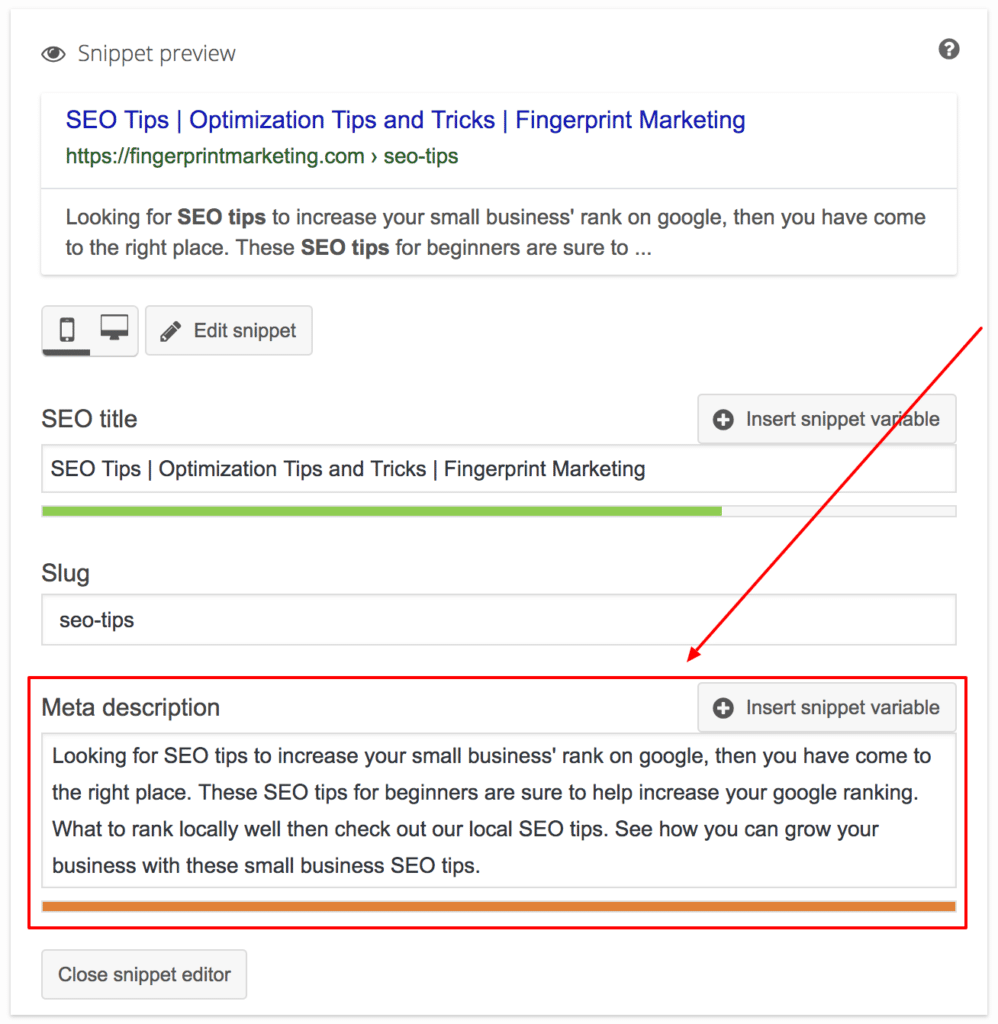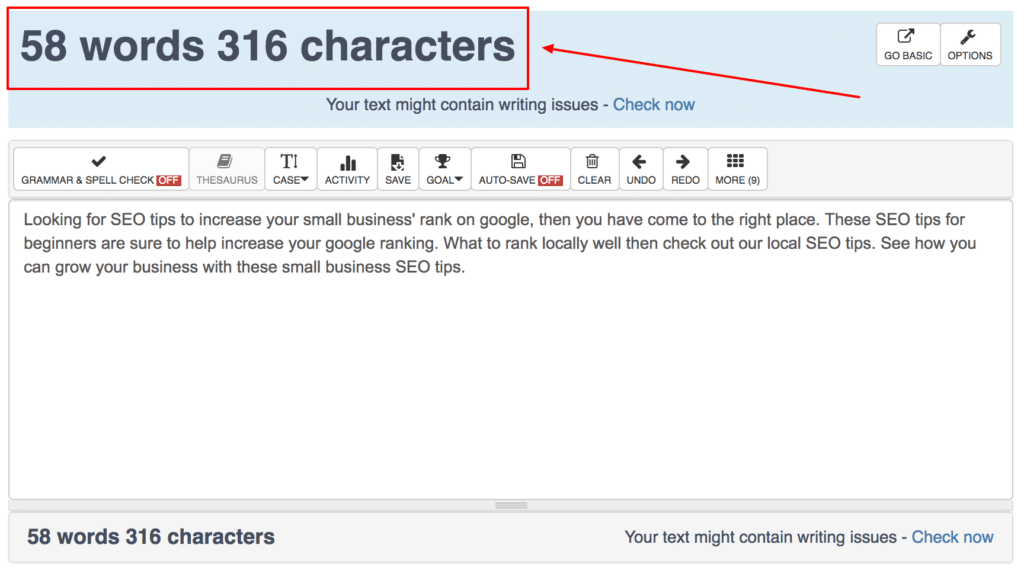What Is SEO?
Search Engine Optimization (SEO) is the process of optimizing your website for ranking on Google. There are five basic principles to keep in mind to ensure that you are doing everything you can to boost your website.
Contents
- 1 What Is SEO?
- 2 Research
- 3 Site Structure
- 4 Authority
- 5 Relevance
- 6 Content
- 7 Why Is SEO More Important Now than Ever Before?
- 8 SEO Tips #1: Conduct Keyword Research to Determine What You Want to Rank For
- 9 Why You Should Not Just Guess on Keywords
- 10 SEO Keyword Research Tools
- 11 SEO Tips #2: Build Your Website Around SEO Instead of Building SEO Around Your Website
- 12 SEO Tips #3: Make Sure That Your Titles and Headers Contain Keywords That You Want to Rank For
- 13 SEO Tips #4: Add Meta Descriptions to Your Web Pages
- 14 What Happens If You Do Not Write Your Own Meta Descriptions
- 15 How to Measure the Length of a Meta Description
- 16 SEO Tips #5: Optimize Your Site’s Load Speeds
- 17 SEO Tips #6: Use Shorter URLs
- 18 SEO Tips #7: Transcribe Your Videos
- 19 SEO Tips #8: Make Sure That Your Pages Have Enough Content
- 20 SEO Tips #9: SEO Is Not a Substitute for Good Content
- 21 Give Fingerprint Marketing a Call
- Research
- Site structure
- Authority
- Relevance
- Content
Research
The way we search on Google isn’t always intuitive, so an extensive research phase will help capture the best keywords to help promote your website and products. Finding core keywords is the first step for structuring a website to promote SEO. The second step is finding keyword variations and relevant phrases that will support your core keywords.
You might be surprised by how much creativity is required in keyword research. The searcher must be prepared to search any and all variations to find out what version of a word is the most frequently searched. For example, off the top of your head, do you think that people search for “SEO” or “search engine optimization”? It’s important to be able to think of every possible variation as this could be the difference between a few searches every month and a few thousand searches.
Site Structure
When your website is indexed, Google spiders tour it to test the structure and content. Things to include: strong content, links to every page that should be indexed, and meta-data. Things to avoid: duplicate content, empty pages, and broken links. Any mistakes could impact the ability of your website to rank.
Authority
If you have solid, informative, relevant content on your website, other sites are more likely to link to it. The more quality sites that link to your site, the more authority you will build. It’s far easier for websites with high authority to link in searches. It’s important to create great content to encourage engagement, shares, and links.
Relevance
Each page on your website is ranked separately. If you own a digital marketing agency and you write a blog about web design, that article won’t rank for marketing. You want to ensure that the content you are publishing is relevant for your site and product. There should be a strategy and reasoning behind every choice you make for your site.
Content
The Google bots are smart enough that they can tell if a website has quality content, so there are two reasons to keep the good content flowing:
- Good content will rank well on Google
- Good content will encourage clicks, links, shares, and engagement which will, in turn, improve ranking.
Why Is SEO More Important Now than Ever Before?
SEO has existed in one form or another since the dawn of Google. It’s a constantly evolving industry that changes as frequently as Google releases a new update. The Google bots that crawl websites have become so advanced that a few website tricks and tweaks will no longer enable your site to rank well. You now need complex SEO campaigns, quality content, and a cohesive website structure in order to ensure a rise in rankings.
With over three and a half billion Google searches happening every day, SEO is more important than ever before. With most websites practicing SEO techniques, the top ranking websites on sea
rch engines no doubt have solid structure and keywords in place. If you don’t have thoughtful SEO, your website may as well not exist in terms of the internet.
SEO Tips #1: Conduct Keyword Research to Determine What You Want to Rank For
You have complete control over what your website will rank for. Take the time and do the research to discover how people are searching for your product. Structure your website around the keyword strategy that you put together. Ensure that your keywords are relevant, but that they are also achievable, with low rates of competition. Some keywords are simply over-saturated on search engines and should not be attempted. For example, you probably shouldn’t try to rank for Apple.
Why You Should Not Just Guess on Keywords
As we stated before, people don’t always search the way we think they will. The difference between LA, L.A., Los Angeles, La La Land, and the City of Angels might be a few thousand clicks per month. Be thorough with your keyword research, and do not guess, as you will most likely be paying with low traffic.
Also, be sure to run your own searches to vet your keyword choices. For example, La La Land is more likely to bring search results for a film, rather than a city these days.
SEO Keyword Research Tools
Ahrefs – Ahrefs is a powerful SEO tool that provides insight on your pages, traffic, and backlinks, as well as extensive keyword planning assistance and keyword search capabilities.
Google Trends – Google Trends is a fairly straightforward tool where you can go if you’re considering an article on two similar items, but need to know which one might generate more traffic. For example, you could use it to find out if more people are searching for pepperoni pizza vs. vegetarian pizza. It also offers limited data on where people are conducting those searches.
Google Keyword Planner – Google Keyword Planner is a great assistance for building and perfecting your website structure. You start with a broad keyword search, based on your website. The tool helps you find other relevant keywords that will help expand pages and create a more cohesive plan.
Keyword Explorer (by Moz) – Keyword Explorer is another tool that assists in building a keyword plan for your website, similar to the Google Keyword Planner tool. Both are solid options, so your choice will be more based on which tool you prefer.
SEO Tips #2: Build Your Website Around SEO Instead of Building SEO Around Your Website
You know how it can be painful to add public transportation into a bustling city that has been growing for the past hundred years? It’s similarly difficult to integrate SEO into an existing website. Most websites are beasts that have been updated and added to for years. Running an audit on an existing website can resemble Swiss cheese when you take account of all the potential SEO optimizations that need to happen.
Building a website from the ground up with solid SEO is ideal.
This isn’t suggesting that you should ignore SEO if you have an existing website. SEO will help your rankings improve, even when added long after the website was built.
SEO Tips #3: Make Sure That Your Titles and Headers Contain Keywords That You Want to Rank For
You should be very aware of the keywords that you use for your website. You want to ensure that you are doing your best to attract potential clients/audience/customers to your business. Otherwise, you are wasting your time building needless content. All of your chosen keywords should have reasoning behind them and should be relevant to what you are trying to communicate/sell/share.
SEO Tips #4: Add Meta Descriptions to Your Web Pages
According to Google, meta descriptions do not figure into ranking. However, your keywords should have a presence in your title, meta descriptions, and page content. Google wants to ensure that the most relevant content is ranked on the first page, so all of your content should communicate to Google exactly what it is about.
When your page shows up in a Google search, the words that have been searched will show up in the description in bold text. Searchers are looking for something specific, and if they see what they are looking for mirrored in your meta description, they are more likely to click. So, be thorough and informative with your description.
What Happens If You Do Not Write Your Own Meta Descriptions
If you do not write your own meta description, the first few sentences of the page in question will be indexed. You want control over what shows up in search results as there is no guarantee that the first paragraph of your text will be relevant to the search. Often you will see search results with a line of code, or simply contact information where the meta description should go.
How to Measure the Length of a Meta Description
The current length for meta descriptions for Google results is roughly three hundred characters. The paragraph will be truncated once the length surpases about that number. Two-hundred-eighty characters is a safe length if you don’t want your words to be cut off.
If you use typical writing software, there will be tools to count your characters. There are also web tools available to help with the task, like WordCounter.
SEO Tips #5: Optimize Your Site’s Load Speeds
Loading speed is an important measure for Google to be able to judge whether your website is mobile optimized or not. Every year websites are getting larger and more complex, but web surfers are also becoming less patient. Expectations for load speeds are getting higher. Research indicates that 53% of web surfers will leave sites if they take longer than three seconds to load. It’s recommended that you strive to keep your load times under that three second mark.
The quickest way to give your loading speeds a boost is to compress all of your images. Images can take up a lot of space on your site, and compressing them is a quick fix and won’t remove any of the quality. You can do this by popping them into web tools like TinyJPG.
It’s also a good idea to audit your site to see if there is any unnecessary content on your pages. The more files, images, and videos you have hosted on your page, the longer it takes to load.
SEO Tips #6: Use Shorter URLs
There are a couple reasons to use shorter URLs and it’s all about the user experience.
- Google will show the keywords in your URLs in search results.
- Studies indicate that URLs play a large part in where someone decides to click in their searching.
- When people share links on social media, it is more appealing for people to know exactly what they should expect if they decide to click.
- Shorter URLs are easier to copy and paste
- URLs that clearly communicate the content perform better than URLs that contain arbitrary text or have been shortened through web tools.
SEO Tips #7: Transcribe Your Videos
Video is the future of marketing. Video is projected to claim upwards of 80% of web traffic by 2019. However, video doesn’t make great SEO content because search engines cannot read audio files yet.
The solution for this is to transcribe your videos into text and include both the video and the text on your page. Be sure to optimize it for SEO with headers, lists, and tables when appropriate.
SEO Tips #8: Make Sure That Your Pages Have Enough Content
One way to build the ranking power of a page that hasn’t built a lot of authority yet is to lengthen your content. If you provide informative content that surpasses the length and value of a website with high authority, there’s a good chance your website will rank higher than the site with higher authority.
Spend time researching your keywords to find out who is ranking, and how much content they are providing. Make decisions on your own content length based on what you find. Your content should beat that of your competition by about 500 words in order to improve your chances of ranking.
SEO Tips #9: SEO Is Not a Substitute for Good Content
Content is a large component of SEO. The technical elements you implement on your website should be complimented by the content you also provide. As many SEO experts would tell you, “Content is key.”
When your site is indexed, Google scans your pages looking for several factors; site structure, relevance, duplicate content, and meta-data. High up on their list of priorities is content. So ensure that your content is high quality, information, dense, and provides answers to the questions that searchers are seeking.
Give Fingerprint Marketing a Call
This is where we come in. It can be overwhelming to handle all of the SEO for your website on your own, without guidance. At Fingerprint Marketing we have an experienced team of SEO experts to help drive traffic to your website and to help you get found on the internet. Call us today for a complimentary fifteen minute consultation and find out how we can help you.



